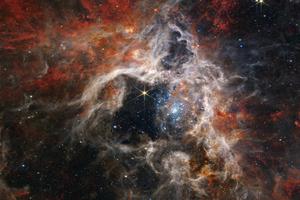Totality or Nothing: What the Solar Eclipse Revealed About God
God simply never tires of ways of delighting us.

Awesome is an overused word. On Monday, I was lucky enough to experience a total solar eclipse.
It was … awesome.
Although I think I could easily give a dozen reasons why I found it so moving, I will offer just two.
First, consider that a total solar eclipse is almost universally acknowledged to be one of the most incredibly beautiful sights in all of nature. But we must stop for a moment to consider the fact that, for this beauty to even be possible, the sun and the moon need to be precisely the same relative size in the sky. We might simply take for granted that a planet’s sun and moon are precisely proportionate to each other. However, there is no scientific explanation or necessity why this should be the case. Indeed, astronomers haven’t observed any examples of this type of perfect moon/sun relationship elsewhere in the observable universe. The official explanation is: there is no explanation; it’s just a very, very, lucky coincidence.
I would rather believe that God simply never tires of ways of delighting us.
Jesus tells us that we should become like little children. He further tells us that we are to be perfect, as his Father is perfect. It is the delightful things in nature like this that make me realize that God is, in a sense, most childlike. Children create little drawings or paintings and run to their parents exclaiming: “Look! Look at what I’ve made for you!”
God does the same.
He took the entire universe and fashioned it in a way that we would find pleasing and beautiful. In doing so, he too exclaims, “Look! Look at what I’ve made for you!”
The second reflection I would offer is this: God is the Great Romantic.
At the final moments of totality, as the entire sky was blackened all around, there was a moment — a split second — when I was able to see what is known as “the diamond ring effect.” It is at this moment, when the purest light you will ever see suddenly appears, that the sun reveals itself to become a cosmic diamond.
For the romantic, no deed seems too bold to show their beloved the extent of their love. “I will move heaven and earth,” they tell their beloved. Only, for the Great Romantic, he does not mean this in any figurative sense.
When a man proposes, he will wait until the perfect moment and then unveil the ring to his lady, so that she can look on its beauty.
God does the same.
Men will look for the perfect ring to bestow on their beloved.
God does the same.
Only, he is not content with offering a mere diamond of the Earth. Instead, he creates an entire solar system to propose his love for us. How bold is his love? What gems does he believe we deserve? Nothing less than this: the very sun and moon.
Every man who has shopped for a diamond for his beloved will remember that the most sought-after diamonds are those that have the fewest blemishes. This is known as the diamond’s clarity. A diamond sparkles the brightest when it reflects the light from the sun; the fewer imperfections, the more it can reflect the sun. We may say a diamond is beautiful precisely in proportion to how much it can show forth, not itself, but the sun’s light. A so-called flawless diamond is incredibly rare. Of course, there is no such thing as a truly flawless diamond. But, if there were, it would be a diamond that would not absorb any light for itself and would reflect all the light of the sun. But God will not offer his beloved a ring with flaws. The truly flawless diamond would be one where the light wasn’t reflected at all, but rather, the light and the diamond would be one and the same. That is what God offers us. The light is the diamond, and the diamond is the light.
That’s why there was a gasp, in that split second, from all of us who suddenly beheld the extravagant excess of Divine Romance, as he said to each of us, “Take this ring as a sign of my love and fidelity.”
… My God, what is a heart,
That thou shouldst it so eye, and woo,
Pouring upon it all thy art,
As if that thou hadst nothing else to do?
… Teach me thy love to know;
That this new light, which now I see,
May both the work and workman show:
Then by a sunbeam I will climb to thee.
—Matins, George Herbert
- Keywords:
- creation
- god's love
- god
- eclipses
- eclipse

















